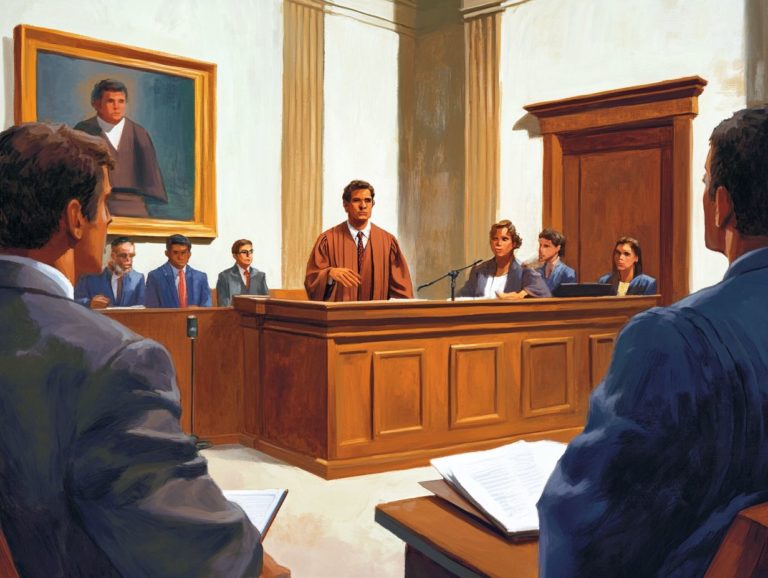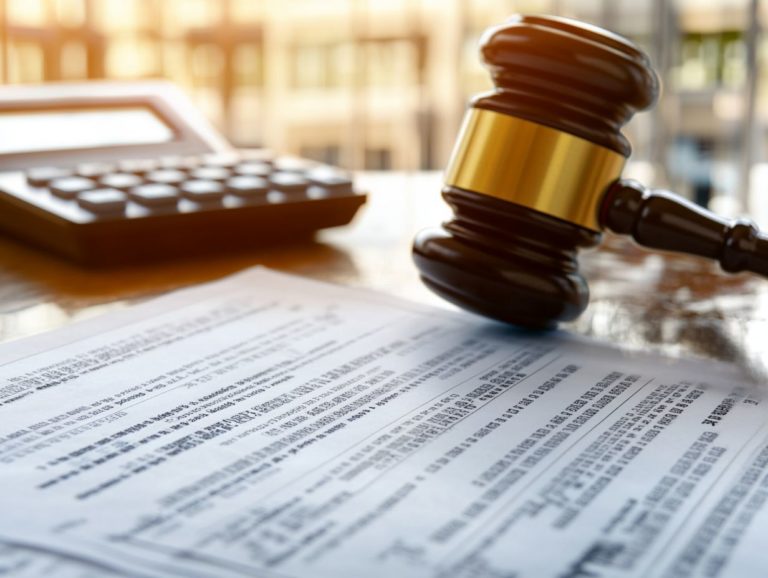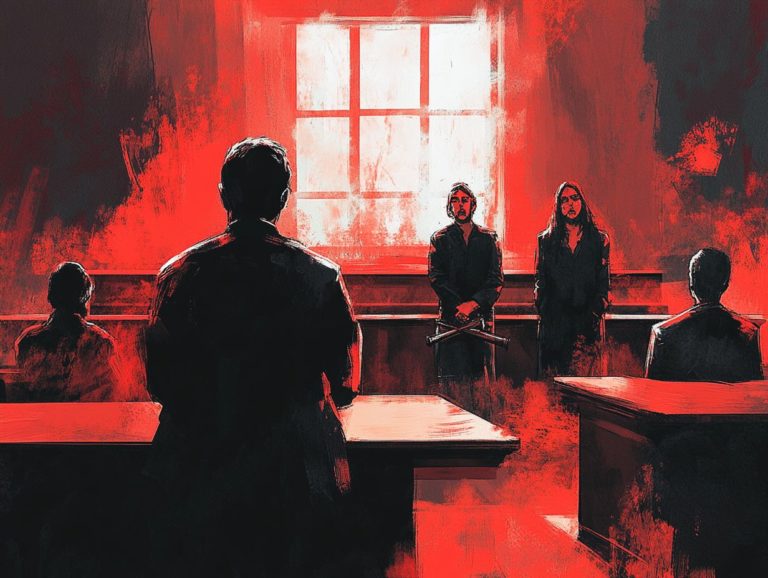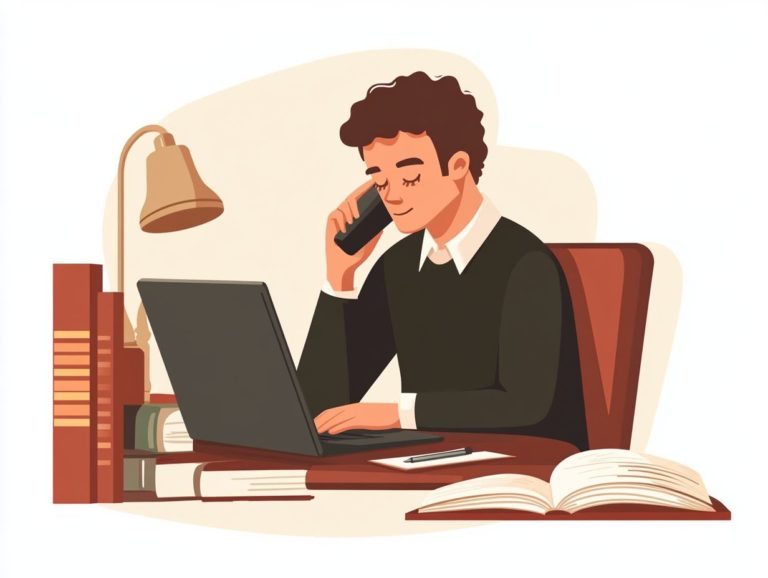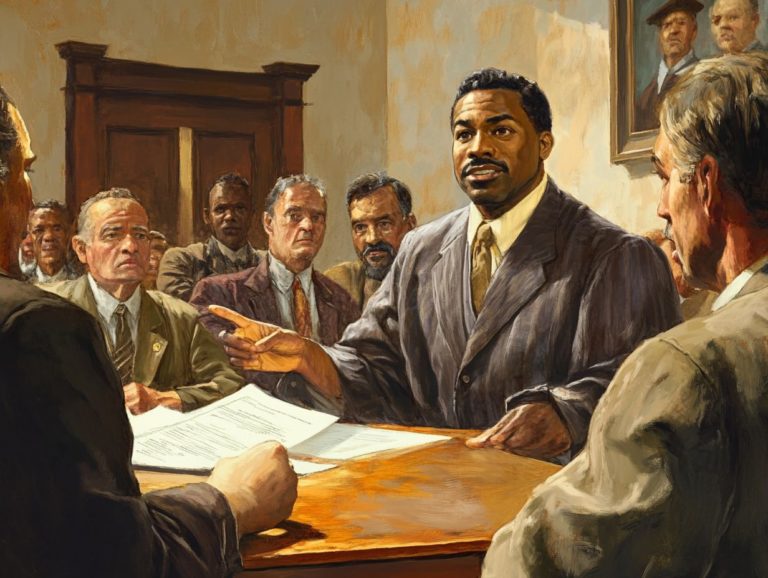How to Handle Evidence in a Criminal Case?
In the realm of criminal law, evidence is the backbone of every case you encounter. From the initial collection to the courtroom presentation, understanding how to manage evidence is essential, not just for legal professionals but for you, the informed citizen.
This article delves into the diverse types of evidence, outlining the proper procedures for collecting and preserving it, along with the legal standards that determine whether evidence can be used in court.
You’ll also explore how to evaluate evidence, strategies for presenting it effectively in court, and the responsibilities that come with handling sensitive information.
Join us now to discover the critical elements of criminal cases! You ll gain vital insights into evidence and its role in the justice system.
Contents
Key Takeaways:
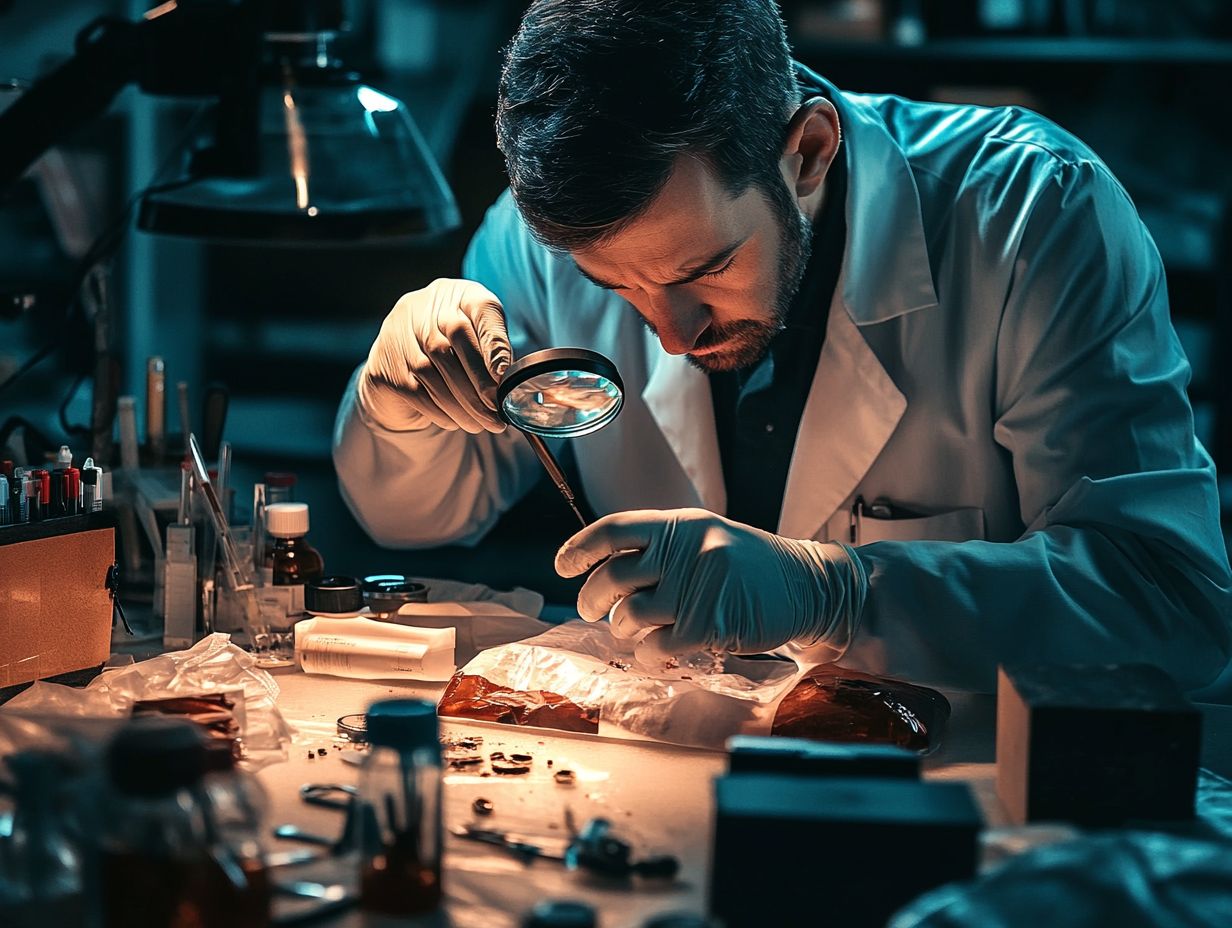
- Understand different types of evidence in criminal cases this knowledge can make or break your case!
- Properly collecting and preserving evidence is crucial for ensuring its reliability and admissibility in court.
- When evaluating evidence, consider its relevance, credibility, and potential challenges to build a strong case.
Understanding Evidence in a Criminal Case
Understanding evidence in a criminal case is vital for ensuring a fair trial and safeguarding the rights of defendants, especially within California s legal framework.
The nature and types of evidence presented can profoundly influence the outcome of criminal trials. This means knowing the different forms evidence can take, such as real evidence, testimonial evidence, and digital evidence.
Additionally, this knowledge includes understanding the roles of courts and juries in evaluating evidence and determining its admissibility, in accordance with legal standards like the Fourth and Sixth Amendments.
Types of Evidence
In criminal trials, you ll encounter various types of evidence, each with a distinct purpose and specific standards for admissibility.
Real evidence includes tangible items, while demonstrative evidence visually represents information. You ll also find documentary evidence in the form of documents, digital evidence comprising electronic files, and testimonial evidence derived from witness statements.
Grasping these different forms of evidence is essential for any California criminal defense attorney as they craft a persuasive case.
Real evidence, such as weapons or clothing, can provide a direct link between a defendant and the crime scene, bolstering its credibility.
Demonstrative evidence, like charts or animations, breaks down complex information, making it easier for juries to digest.
Documentary evidence, which can include contracts or emails, offers a written record of events and is often crucial for establishing timelines or intentions.
Digital evidence ranging from text messages to surveillance footage highlights the modern landscape of criminal activity.
Lastly, testimonial evidence comprises statements from witnesses, which can be highly influential if their credibility is well-established.
Each type of evidence plays a pivotal role in courtroom dynamics, and understanding their subtleties could very well determine the outcome between conviction and acquittal.
Collecting and Preserving Evidence
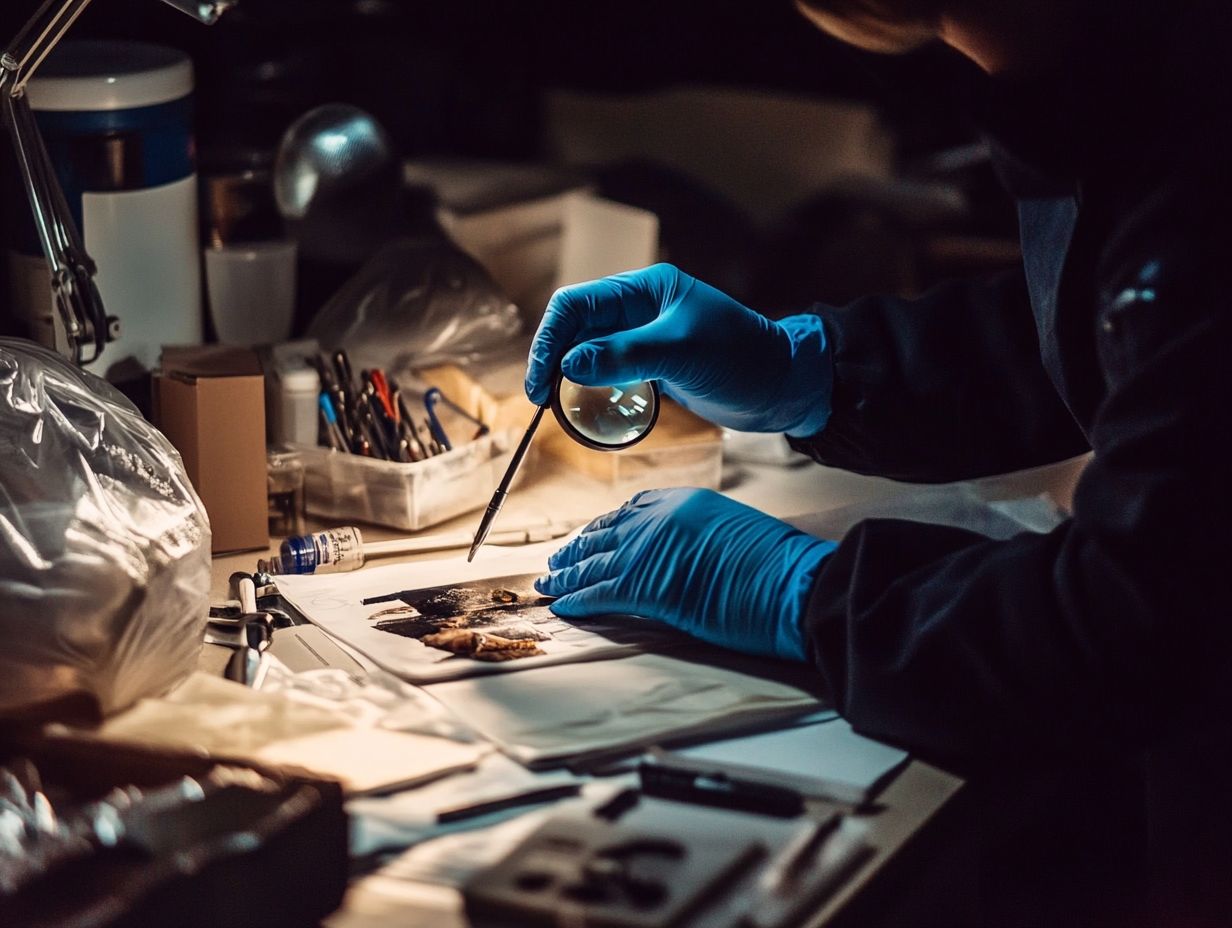
Collecting and preserving evidence in criminal investigations is crucial for ensuring that it remains admissible in court while maintaining its integrity throughout the legal process.
You must manage the chain of custody meticulously. Any breach in this chain could raise doubts about the evidence’s authenticity and reliability.
This has significant implications for the defense strategy, especially for California criminal defense attorneys representing clients under the jurisdiction of the McCready Law Group.
Proper Procedures and Techniques
Collecting evidence properly is vital in criminal investigations. This ensures that everything gathered is usable in court, especially under California law.
Your initial response to a crime scene is crucial. Meticulous documentation of evidence helps maintain its integrity and protect the rights of the accused.
Following legal standards builds public trust in the legal system. Effective evidence collection includes securing the crime scene and preserving physical evidence.
Organizations like the McCready Law Group train their attorneys in the relevant laws and investigative techniques. Their attention to detail means evidence is collected correctly, which is essential for defending clients.
Understanding the nuances of evidentiary rules can significantly influence a case s outcome.
Admissibility of Evidence
The admissibility of evidence involves complex legal requirements that can greatly affect criminal trial outcomes. As a defense attorney in California, you must understand these intricate requirements.
Understanding exculpatory and hearsay evidence, along with specific court standards, is crucial. These factors dictate whether evidence can sway a jury s decision.
Legal Requirements and Challenges
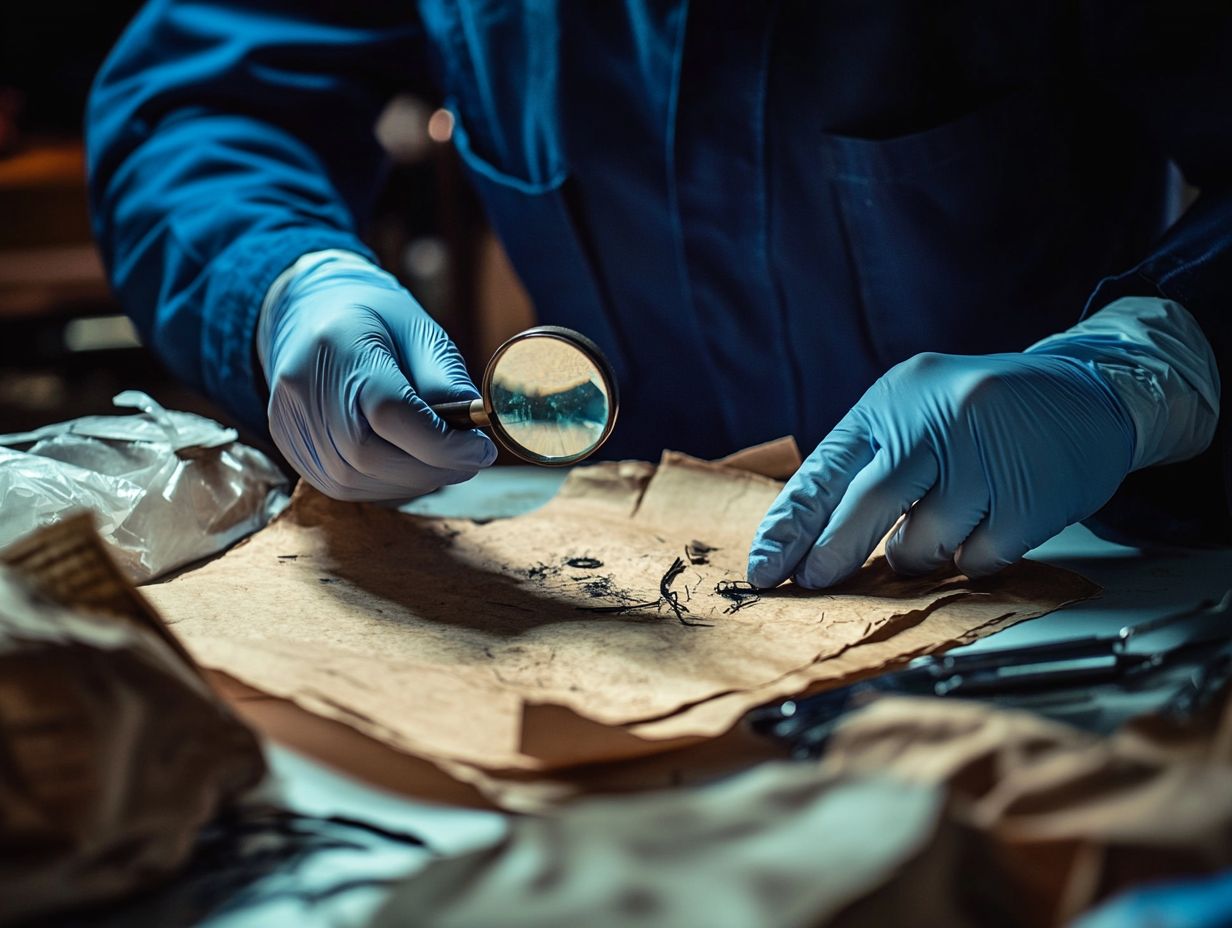
Legal requirements can pose substantial challenges for criminal defense attorneys and prosecutors. You must follow strict guidelines set by California law regarding what can be presented in court.
The legal landscape for evidence is complicated. Various laws determine what is permissible, including rules for witness testimony and physical evidence.
This careful examination can lead to intense legal battles. Both sides work hard to support or undermine the evidence.
It’s important to stay alert to any procedural errors that could jeopardize your case. As you navigate hearsay rules and relevance standards, each piece of evidence must be legally and ethically obtained.
The stakes are sky-high! The outcome of a trial may hinge on the court s acceptance of your evidence.
Evaluating Evidence
Evaluating evidence is essential in a criminal trial. It requires careful analysis of factors affecting the weight and relevance of the evidence.
As a California criminal defense attorney, assess witness testimonies, expert opinions, and material evidence. Evaluating the strength and significance of the evidence is crucial.
Factors to Consider
When evaluating evidence, several critical factors need your attention. Focus on the reliability of witness and expert testimonies and the integrity of the chain of custody.
Each element can profoundly influence the case outcome. Understanding how witnesses perceive events is crucial to recognizing potential biases.
Scrutinize expert testimony for relevance and credibility. Consider their qualifications and experience.
Maintaining a secure chain of custody is vital. Any break in this continuity can raise doubts about the evidence’s integrity.
These factors create a strong framework for building a robust defense. It’s essential to ensure that justice is served diligently.
Using Evidence in Court
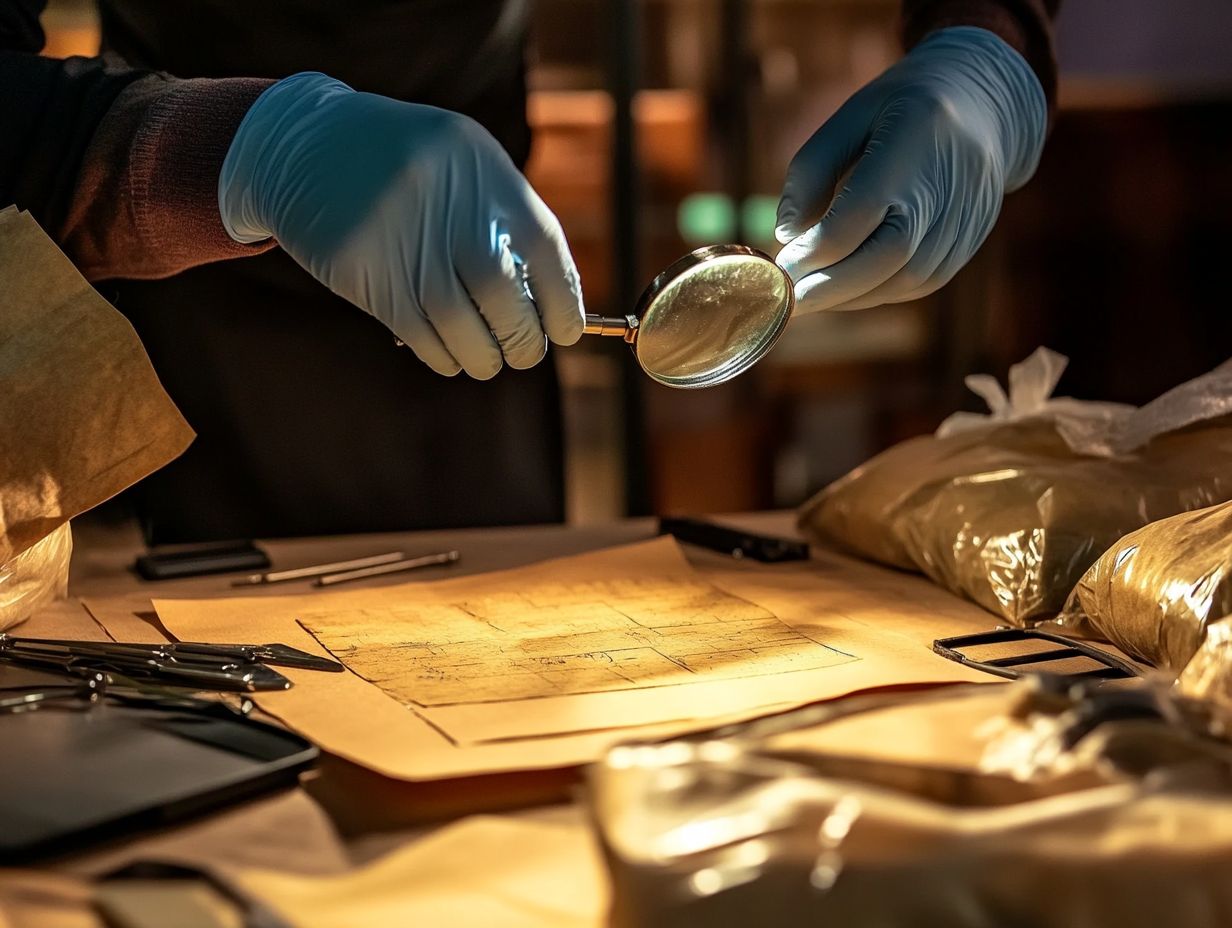
Utilizing evidence in court requires a strong presentation and the ability to effectively challenge opposing evidence. This process is a cornerstone of criminal trials.
As a California criminal defense attorney, you must present your evidence skillfully. This includes witness testimonies and other forms of evidence. You must also confront and counter the prosecution’s challenges.
This agility is crucial for maintaining a robust defense for your client.
Presenting and Challenging Evidence
Presenting and challenging evidence in court is dynamic and demands meticulous planning. This is especially true for witness and expert testimonies.
As a defense attorney, you must showcase your evidence effectively. You must also anticipate the prosecution’s arguments to uphold your case’s integrity.
Analyzing witness credibility and the reliability of expert opinions is vital for constructing a strong defense.
Mastering cross-examination techniques is essential. Cross-examination is when you question a witness to find inconsistencies. This helps pinpoint biases in opposing testimonies.
By skillfully dissecting the evidence, you can strengthen your arguments and instill reasonable doubt among jurors.
Understanding evidential rules is crucial. It can significantly influence the trial’s outcome and uphold justice in the courtroom.
Handling Evidence Ethically
Handling evidence ethically is crucial in the legal profession. You must uphold strict ethical standards and professional responsibilities during the criminal trial process.
By adopting these standards, you preserve the integrity of the legal system. You also safeguard the rights of defendants, a principle strongly championed by firms like the McCready Law Group in California.
Professional Standards and Responsibilities
Professional standards and responsibilities shape how, as an attorney, you must handle evidence. They emphasize the critical need for ethical practices within the criminal justice system.
These standards exist to ensure that evidence is treated with the utmost care, preserving its integrity and relevance throughout legal proceedings.
In California, you are bound by strict ethical rules that dictate how evidence should be collected, preserved, and presented. Ignoring these standards doesn t just weaken your case; it can also endanger the rights of defendants, leading to wrongful convictions or dismissals.
Upholding these responsibilities plays a vital role in fostering a fair trial process. Your commitment to ethical practices can greatly affect trial outcomes and help build trust in our justice system.
Frequently Asked Questions
What is considered evidence in a criminal case?
Evidence in a criminal case can include physical items, such as weapons or stolen property, as well as documents, photographs, witness testimony, and forensic evidence like DNA samples.
How should evidence be collected and handled?
Evidence should be collected and handled carefully to ensure its integrity and admissibility in court. It should be properly labeled, stored, and documented to maintain the chain of custody.
Can evidence be used in a criminal case if it was obtained illegally?
No, evidence obtained illegally, such as through an unlawful search or seizure, cannot be used in a criminal case. This is known as a law that keeps illegally obtained evidence out of a trial.
What is the role of the prosecutor in handling evidence?
The prosecutor is responsible for presenting evidence to the court that supports the charges against the defendant. They must also disclose all evidence to the defense, including any that may be favorable to the defendant.
What should I do if I believe the evidence against me has been mishandled?
If you believe that evidence in your case has been mishandled, it is important to consult with an experienced criminal defense attorney. They can evaluate the evidence and determine if there are any grounds to challenge its admissibility in court.
How can I ensure that evidence is handled properly in my case?
You can ensure that evidence is handled properly by hiring a competent and experienced criminal defense attorney. They will have a thorough understanding of evidence handling procedures and can carefully review all evidence in your case to identify any potential issues.

